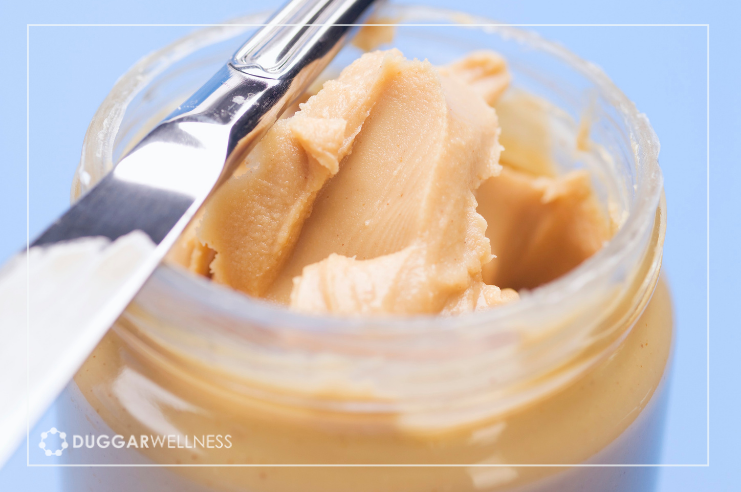Creamy or chunky, with chocolate or with jelly, peanut butter has been an American staple for generations and today we celebrate because January 24th is National Peanut Butter Day here in America.
Every day is “National Something-or-Other Day” and I think that’s great, it reminds us to celebrate each day. So how do you feel about celebrating peanut butter today?
Personally I love peanut butter, it is just so delicious! But, as I continue my journey of learning about the benefits of food I have learned that my beloved peanut butter may not love me back in the same way.
Why Peanut Butter can Be Unhealthy
Peanuts are high in omega-6 fatty acids. Omega-fatty acids are essential and we do need them in our diet. We need good fat in our diet, but too much of a good thing can be bad. Too many omega-6 fatty acids cause inflammation. Most western diets have been shown to be deficient in omega-3 fatty acids (the anti-inflammatory fats) and have excessive amounts of omega-6 fatty acids.
That being said you should evaluate your diet. Too many omega-6 fats can lead to an increase in asthma, type 2 diabetes, obesity, irritable bowel syndrome, metabolic syndrome, and more.
If you are eating a diet high in processed foods or foods fried in hydrogenated vegetable oils you can be sure your omega-6 levels are too high. Begin reducing your intake of these processed foods and oils and replace the hydrogenated oils with natural fats like coconut oil or ghee. Boost your omega-3s by eating wild-caught fish, grass-fed beef, sea vegetables and nuts and seeds, especially walnuts, flax seeds, chia seeds, hemp seeds, and pumpkin seeds.
When a Nut isn’t Really a Nut
Peanuts are not actually a nut at all, they are a legume, like a bean or a pea. That doesn’t make them good or bad. Unlike most nuts, which grow on trees, peanuts grow underground. Because of this, they are highly susceptible to mold and fungus that produces aflatoxin. Aflatoxin is a carcinogen that has been associated with liver cancer, impaired growth in children as well as developmental delays. Aside from these conditions exposure to toxic mold has also been shown to increase depression, and is to blame for food allergies or inflammatory immune reactions to peanuts. On a positive note, there is research that indicates that aflatoxins may be reduced as much as 89% when peanuts are processed into peanut butter.
Three Suggestions for Consuming Peanut Butter
Buy Organic and Variety Specific: There is a variety of peanuts that you can buy that is not subjected to mold during growing. These are Valencia peanuts, they are grown in Texas and New Mexico in dry sandy soil. Peanuts are also one of the most pesticide-ridden crops, so buying organic is a must.
Eat in Moderation: It is a good idea to eat peanuts and peanut butter in moderation. As mentioned above we want to avoid eating too many foods high in omega-6 fatty acids. Every now and then, not every day.
Read the Label: Peanut butter is one of the most consumed foods and 99% of peanut butter available for purchase contains added ingredients like hydrogenated oils and sugars. Look for brands that contain only organic Valencia peanuts and maybe some added salt. My favorite brands are Kirkland Signature Brand Organic Peanut Butter from Costco or Trader Joe’s Organic Valencia peanut Butter. It’s up to you if you choose creamy or crunchy!
Non-Peanut Butter Options
If you’ve decided to steer clear of peanut butter altogether, there are many other great alternatives to nut butter. I’m a fan of almond butter, cashew butter, and hazelnut butter. If you need a nut-free alternative sunflower seed butter is wonderful. Just stick to the same criteria for these alternatives: organic, sugar-free, and hydrogenated oil-free.
Recipes to Celebrate National Peanut Butter Day

 140 N Main, Bountiful, UT 84010
140 N Main, Bountiful, UT 84010  801-677-7878
801-677-7878

 Apple Stackers
Apple Stackers
